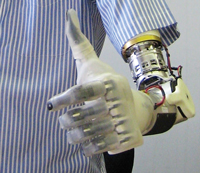Over 1,100 soldiers who have fought in Afghanistan and Iraq have had one or more of their limbs amputated from the year 2003.
 Prosthetic Arm
Prosthetic Arm
As a consequence of this, Alion Science and Technology are leading a a modelling and research effort with the help of an 18 month, $1.4 million contract from the US Army Medical Research Acquisition Activity. This project will explore improved and more affordable ways to integrate robotic control into prosthetic limbs.
Alion will develop a protocol and modelling tools that aims to make prosthetic limbs, lighter, more afforadable, more functional and more energy efficient, thus improving battery life. This will be achieved in part by the deisgn amd implementation of implantable electronic sensors, along with the development of virtual prototyping simulation models which will combine to give the amputee better control of the prosthetic device.
These electronic sensors will be implated by syringing into viable nerves and muscles, while sophisticated 3D models will be developed using ultrasound images, a great leap forward from the use of manequins. Alion will also create a database of muscles by working with live limbs and ultrasond imaging to help tailor prosthetics to the individual user.
The project also seeks to develop a model for creating unique prosthetics to suit individuals, rather than a one size fits all approach which will greatly benefit the user.
Alion has partnered with Sigenics, a developer of integrated circuits for the project.